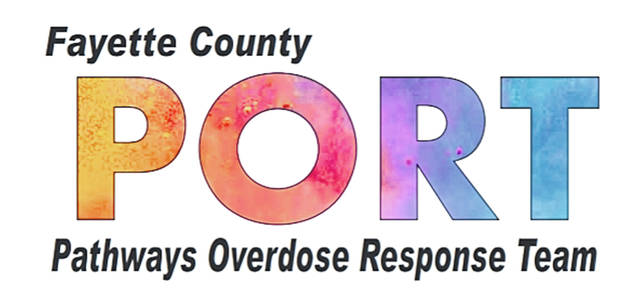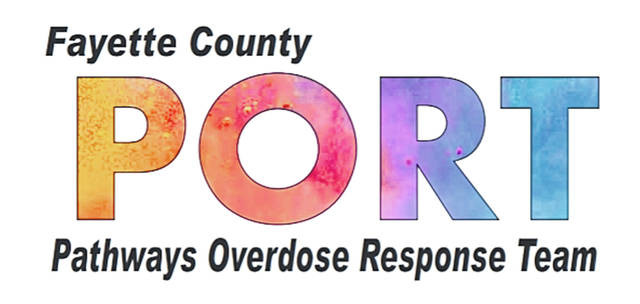

Editor’s note: This is the second story in a series relating to local resources for addiction and recovery. The information in this article came from an interview recently held between the Record-Herald and the local Pathways Overdose Response Team (PORT).
The local Pathways Overdose Response Team (PORT), also called the Quick Response Team (QRT), reaches out to individuals who recently overdosed to provide resources for recovery options. As one of the main goals of PORT is to ensure community involvement, various entities are represented on the PORT team.
Representatives include probation officer Brian Carlson representing the Washington Municipal Court, EMS paramedics Hannah Dingman and Tony Kegg representing the Fayette County Memorial Hospital Community Paramedic Program, site supervisor Kyndle Clark representing Fayette Recovery Center, nurse Ashley Roberts (RN) representing Fayette County Public Health (FCPH), substance abuse counselor Mark Allen representing Scioto Paint Valley Mental Health, outreach coordinator Christopher Skelly representing Ohio Addiction Recovery Center, and coordinator Joe Cantrell and admin assistant Jessica Pfeifer representing Pathways to Recovery.
PORT is just one aspect of the Pathways to Recovery program which was started early 2019 and consists of five certified Peer Recovery specialists who have a lived experience of addiction and have found recovery. By becoming a peer of Pathways to Recovery, individuals have access to case management, care coordination, transportation for treatment, education for friends and family, etc. The program helps make connections for individualized needs to stabilize their lives.
Cantrell explained, “everyone’s different, everyone has their own pathway. So, the whole thing is trying to talk to them and figure out what’s going to be their best way.”
Brooke Truman has been one of Pathways’ peer support specialists since June of 2019.
“It’s gone very well,” said Truman. “One of the things I look forward to the most is when I accompany the transportation driver (and peer) to treatment. You get to go with the person, have a conversation with them, and then, when you pick them up (once residential treatment is done), there’s this transformation that’s happened and then you kind of start talking about what their plans are to continue recovery.”
Carlson explained that community follow-up is extremely important.
“Once they graduate from a residential treatment, that’s not the end of it, that’s the beginning of it. Mostly, the hard work is when you get back home,” said Carlson. “(The specialists) have been there, done that. They know the importance of those days — making sure they are going to sober-support meetings. That reinforcement — that’s what I see is the value of the peer recovery.”
Truman said, “It’s the connection of one alcoholic to another alcoholic or one drug addict to another drug addict. It’s the connection and it’s sharing your experience, strength and hope with another person.”
Some individuals who utilize the Pathways program are referred to the Fayette Recovery Center, 5 Fayette Center in Washington C.H. According to Clark, the Fayette Recovery Center is part of Pickaway Area Recovery Services (PARS) and is a treatment facility offering Substance Use Disorder (SUD) services and mental health services for all ages.
Programs include residential, partial hospitalization, intensive outpatient, anger management, life and coping skills, telepscyh, Medication Assisted Treatment (MAT), etc.
Clark explained they are person-centered and do their best to accommodate all clients. Referrals come from Pathways but also via self-referral, schools, businesses, medical providers, and court orders.
Aside from court orders, courts can play a big role in addiction and recovery.
Carlson said, “the probation staff will identify people that need extra support for dealing with their crisis at home in their community. So, we want to see that a peer recovery specialist gets linked to them.”
Not every referral comes into the legal system via a drug charge.
“Maybe somebody comes in on a domestic violence charge, but really, not joking, it’s meth-induced psychosis. That’s why it’s domestic violence — it’s a drug case that went violent. So, we’re seeing that and looking at all the components to see where the drug(s) fit into the puzzle. Or it’s a theft case,” said Carlson. “Why were they stealing? To support that habit. Why that burglary or that vandalism? They needed something to boost to sell.”
Even those who are not on probation or in the court system can go to the Municipal Court to request assistance.
“So often, people are trying to do reactionary, but we’re trying to do preventionary. We’re trying to promote, as much as possible, come to the municipal court, and we can get you the resources you need,” said Carlson. “You’re not on paper, you’re not under arrest. There’s no court involved other than I’m sitting in a court. We want to see them get the help they need, not be in (or back in) a court with a drug instrument where we’re forcing them to get help.”
Carlson, along with Roberts and Cantrell, were the three original members of PORT. Roberts used to go out with PORT regularly, but her participation has slowed due to FCPH being busy during the COVID-19 pandemic. While Roberts involvement with PORT has decreased, FCPH is still present.
According to Roberts, FCPH provides a location with a nurse practitioner on-site for members of the community who need assistance to come in and find resources and information.
“We just try to be that bridge. We get a lot of people that walk-in that are currently using that want to talk about detox meds or mental health meds or something like that,” said Roberts. “It’s a way for us to start helping them out and get them connected with other resources.”
FCPH also offers a vivitrol program which is one of many ways that can help people battling an opioid or alcohol addiction. Vivitrol is a Medicated-Assisted Treatment (MAT). When the Vivitrol program started up at FCPH, Roberts explained there were hardly any other resources in town that could offer any type of MAT.
Although FCPH and other various entities exist to help, paramedics can easily be the first to reach a person who has overdosed.
Dingman is from Columbus but drives to Fayette County for work and to be a part of PORT. She is a trainee under fellow PORT representative Kegg.
Dingman said, “The community paramedic program is really focused on helping integrate healthcare in the community for people who can’t necessarily get the support they need or chronic 9-1-1 users, people who are using the ER chronically. So, we have to think about — overdoses are chronic 9-1-1 users. We see a lot of these people multiple times. We know their names, we know where they hang out. We know what they’re doing. So, integrating community paramedics with Pathways is so smart because these are two (entities) working toward the same goal, just under different umbrellas.”
Not only is working with Pathways important for similar goals, Dingman explained it is important to her personally.
“Addiction has touched my life in many ways with friends and family. I’m the age where pain pills were coming up when I was in high school, and when I was in medic school Fentanyl was getting very big. So I feel like my medic career has progressed with the drug trends, and I think this is really important,” said Dingman. “Overdoses are still a public health emergency. COVID is still the big topic right now, but we’re overlooking… Fayette County was just number two in the state per capita for overdose deaths — that’s a big deal. This is a huge deal, and it’s happening right in front of us, in people’s back yards. Your family member may be struggling and you don’t know it, and we want to be the people that are there to help you.”
Cantrell said, “That’s what it takes — these different components. Each person offers their own specialties.”
Follow the Record-Herald for future articles going into detail on different options, programs, the above mentioned representatives in relation to addiction and recovery.
Those who are or know someone who is struggling with substance use, contact Pathways to Recovery at 740-335-7282 or reach out via the Hope Line at 740-463-1009. Pathways to Recovery is located at the Community Action Commission of Fayette County, 1400 N.W. US 22, Washington C.H.
Reach journalist Jennifer Woods at 740-313-0355.


